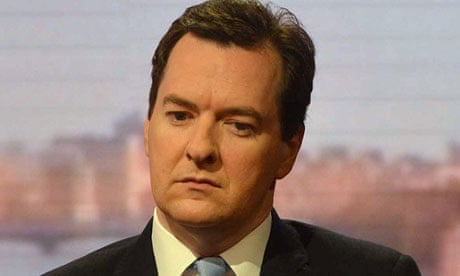This week George Osborne will set out the government's spending plans for 2015-16 with the intention of continuing austerity measures beyond the next general election (Report, 22 June). This will be politically and economically disastrous.
Instead, the government should set out an alternative based around four key pillars. First, there needs to be a significant investment in green and social infrastructure spending. A £55bn stimulus could generate up to 1m jobs, £187bn of additional GDP and almost £75bn in terms of additional taxation.
Second, tough new fiscal rules need to be set, with independent democratic oversight of government spending in order to earn the trust to borrow and spend people's money wisely.
Third, once recovery is assured, there should be an elimination of the structural deficit through a series of progressive tax rises and by making cuts in wasteful public spending.
And last, there needs to be a restructuring of the state and public services in order to ensure sustained efficiency, responsiveness and innovation. This requires a shift to the "coproduction" and localisation of public services that utilises the expertise, commitment and energy of the people who provide services and of the users of the services.
Britain cannot endure more unnecessary years of austerity and those who are least to blame for the crisis must not pay the price for it.
Peter Hain MP
Neal Lawson, Compass
Joe Cox, Compass
Howard Reed, Landman Economics
Tony Atkinson, University of Oxford
Prof Peter Taylor Gooby, University of Kent
Anna Coote, New Economics Foundation
Roberto Veneziani, Queen Mary, University of London
Dr MG Hayes, University of Cambridge
Dr Bruce Philp, Coordinator, Association for Heterodox Economics
Prof Simon Lilley, University of Leicester
Pat Devine, University of Manchester
Ruth Lister, House of Lords
Prof Jan Toporowski, SOAS
Prof Prem Sikka, University of Essex
Prof Gregor Gall, University of Bradford
Prof Michael Lipton, University of Sussex
Stewart Lansley, University of Bristol
Prof Matthew Watson, University of Warwick
Alan Hallsworth (Professor emeritus), University of Portsmouth
Prof Christine Cooper, University of Strathclyde
Prof David Bailey, Coventry Business School
